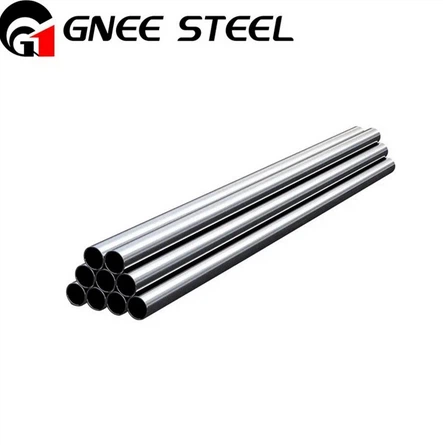1.What is the most common application for K500 Monel?
K500 Monel (UNS N05500) is a precipitation-hardening nickel-copper alloy (based on Monel 400, with added aluminum and titanium for strengthening) renowned for its exceptional corrosion resistance, high strength, and good mechanical performance in both marine and industrial environments. Its most common applications are concentrated in sectors where corrosion resistance and elevated strength (even at moderate temperatures) are simultaneously required, with key uses including:
Marine Engineering:
It is widely used for critical marine components such as ship propeller shafts, pump shafts, valve stems, and seawater-cooled heat exchanger tubes. These parts operate in harsh seawater environments-K500 Monel resists pitting, crevice corrosion, and erosion-corrosion from saltwater, while its high strength (superior to the non-hardened Monel 400) withstands the mechanical stress of rotating or pressurized systems.
Oil & Gas Industry:
Employed in downhole tools (e.g., drill collars, valve components), wellhead equipment, and subsea pipelines. It tolerates corrosive fluids (e.g., brines, hydrogen sulfide, and crude oil byproducts) at moderate temperatures (up to ~315°C/600°F) and maintains structural integrity under high pressure, making it suitable for offshore and onshore oil extraction operations.
Chemical Processing:
Used for pump impellers, agitators, and reactor internals in facilities handling corrosive chemicals (e.g., acids, alkalis, and organic solvents). Its resistance to both chemical attack and mechanical wear ensures long service life in aggressive processing environments.
Aerospace & Defense:
Occassionally used for aircraft engine components (e.g., fuel system fittings, hydraulic valves) and military hardware (e.g., submarine fasteners, missile guidance system parts) that require a balance of corrosion resistance and high tensile strength.
2. What are the advantages of K500 Monel?
K500 Monel's popularity stems from its unique combination of properties that outperform many standard alloys in corrosive, high-stress scenarios:
Excellent Corrosion Resistance:
It inherits the strong corrosion resistance of Monel 400 (a nickel-copper alloy) and enhances it further. It resists seawater, brines, industrial chemicals, and atmospheric corrosion (including urban and marine atmospheres) better than most stainless steels and copper alloys. It also tolerates mild oxidizing and reducing environments, with minimal susceptibility to pitting or crevice corrosion.
High Strength & Hardness (via Precipitation Hardening):
Unlike the soft, ductile Monel 400, K500 Monel achieves high strength through aging heat treatment (typically 450–550°C/840–1020°F). After hardening, its tensile strength reaches ~1100–1300 MPa (160,000–190,000 psi), yield strength ~850–1050 MPa (120,000–150,000 psi), and Rockwell C hardness ~30–40-far exceeding Monel 400. This strength is retained at moderate temperatures, making it suitable for load-bearing corrosive applications.
Good Ductility & Toughness:
Even in the hardened state, it maintains reasonable ductility (elongation ~10–15%) and toughness, avoiding the brittleness common in some high-strength alloys. This allows it to be formed into complex shapes (via forging, machining, or welding) and withstand minor impact loads without cracking.
Resistance to Biofouling:
Similar to copper-nickel alloys, K500 Monel inhibits the growth of marine organisms (e.g., barnacles, algae) on its surface. This reduces maintenance costs for marine components by preventing biofouling-induced drag or blockages.
Stable Performance at Moderate Temperatures:
It retains its strength and corrosion resistance at temperatures up to ~315°C/600°F, outperforming many aluminum or magnesium alloys in warm corrosive environments (e.g., oil well downholes, industrial heaters).




3. What are the disadvantages of K500 Monel?
Despite its strengths, K500 Monel has limitations that restrict its use in certain applications and increase operational costs:
High Material and Processing Costs:
Nickel (the primary component, ~63% by weight) is expensive, and the addition of aluminum and titanium (for precipitation hardening) further raises material costs. Additionally, its heat treatment (aging) requires precise temperature control and extended holding times, increasing manufacturing complexity and costs compared to non-hardened alloys like Monel 400 or stainless steel 316.
Poor High-Temperature Performance:
Its strength degrades significantly above 315°C/600°F. At temperatures exceeding 400°C/750°F, precipitation phases (Ni₃Al, Ni₃Ti) begin to coarsen, reducing hardness and tensile strength. This limits its use in high-temperature applications (e.g., gas turbine components, high-heat industrial furnaces) where superalloys (e.g., Inconel® 718) are more suitable.
Difficult Machinability:
In the hardened state, its high hardness and toughness make machining challenging. It requires specialized cutting tools (e.g., carbide or cubic boron nitride tools), slow cutting speeds, and generous coolant use to avoid tool wear and overheating. Machining in the annealed (soft) state is easier but requires post-machining aging to restore strength-adding extra processing steps.
Susceptibility to Stress Corrosion Cracking (SCC) in Specific Environments:
While highly corrosion-resistant overall, it can suffer from SCC in environments containing concentrated ammonia (NH₃) or amine-based solutions (common in fertilizer production or petrochemical refining). This requires careful environmental assessment and, in some cases, the use of alternative alloys or protective coatings.
Higher Density Than Lightweight Alloys:
With a density of ~8.4 g/cm³ (similar to Monel 400), it is much heavier than aluminum alloys (~2.7 g/cm³) or titanium alloys (~4.5 g/cm³). This makes it unsuitable for weight-sensitive applications (e.g., aerospace structural parts, portable equipment) where lightweight materials are preferred.





